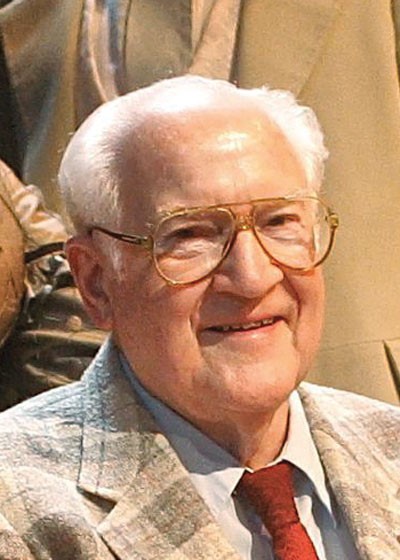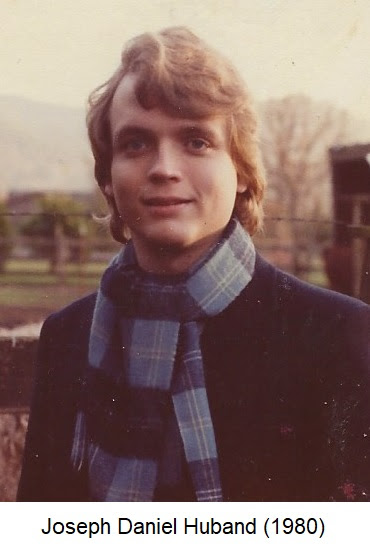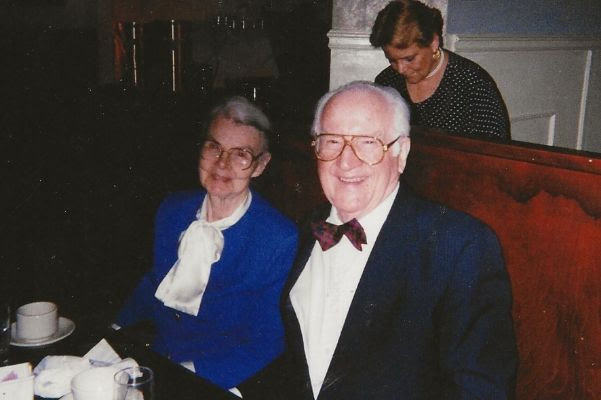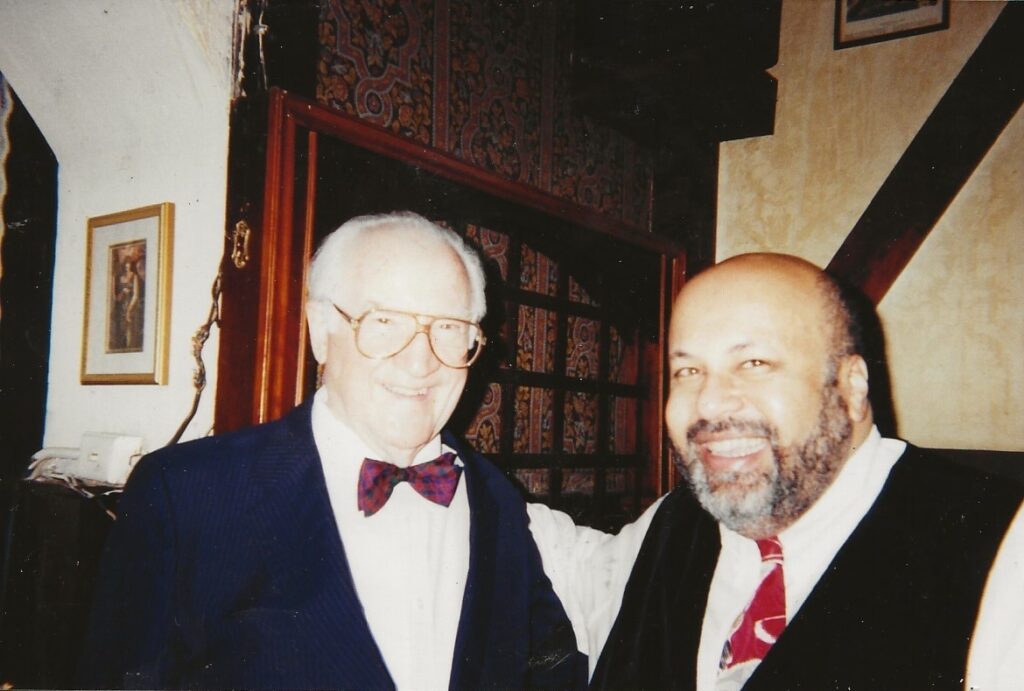Monday Musicale with the Maestro – February 8, 2021 – A Western Set: Celebrating Robert Ward’s Lasting Impression on American Music
This week’s feature is A Western Set: Celebrating Robert Ward’s Lasting Impression on American Music.

One of the great American composers I had the privilege to call a friend was Robert Ward. Born in Cleveland, Ohio in 1917, he studied composition with Howard Hanson (Eastman School of Music) and conducting with Edgar Schenkman (Juilliard). At Tanglewood’s Berkshire Festival, he studied composition with Aaron Copland. During his composing career, he was prolific in all forms of classical music.
From 1967 until his death in 2013, he made his home in Durham, North Carolina and held a variety of administrative positions in the area. He was director of the Triangle Opera, Chancellor of the Durham School of the Arts, and a professor of music at Duke University, where he received an honorary doctorate. He was also the recipient of the North Carolina Award in Fine Arts.
Robert Ward’s composing credo is beautifully captured in the quote below, included by violist Jonathan Bagg of the Ciompi String Quartet in liner notes for their recording of Ward’s First String Quartet. Ward explains that
“By the time of the composition of the First String Quartet, I had reached the conclusion that two cardinal principles prevailed in those works, old and new, which make a lasting impression on the listener. The first is that a work must be based on provocative musical ideas that are clearly stated and, in the case of longer works, are stimulating to a composer’s creative powers. The second is that an aesthetically satisfying work unfolds in sounds which produce waves of alternating tension and relaxation in the listeners, commanding their full attention. I had arrived at these conclusions through the analysis of many works of all periods. In these principles I found the rational explanation for the degree of impact or non-impact which any given work makes on the audience.”
I wish Dr. Ward were still with us so that I could ask him what he meant by “provocative musical materials.” Provocative. Compelling? As a composer, however, I know exactly what he meant by musical ideas that “are stimulating to a composer’s creative powers.” When I’m at the first stages of writing a work, I will put aside for use two or three themes that seem to be pregnant with possibilities. This is a highly subjective evaluation. There is no proof based on musical analysis as to why one theme can seem to be capable of an infinite variety of transformations whereas another can seem to be infertile, dead on arrival. Everything I have ever composed began with two measures of music that seemed to contain a “journey” within them.
I am fortunate that the greatest scholar of Robert Ward’s music—Dr. J. Daniel Huband—has been my best friend for over forty years and has been highly supportive of my desire to compose. It was he who first introduced me to Ward’s music and has helped me gain an even deeper appreciation of it—a gift for which I am eternally grateful.

Daniel Huband was born in 1958 in Richmond, Virginia and began playing the clarinet at age 11. We met in May 1976 at a Philadelphia Orchestra concert in Richmond. After high school he attended the North Carolina School of the Arts and went on to attend the Peabody Conservatory, where he received a Bachelor of Music in clarinet performance. At Ball State he received a Doctor of Arts in Musicology. He has since been on the faculty of the University of Wisconsin and the University of Richmond. His daughter Madelyn is an accomplished violinist who is a psychotherapist in New York City. For our Monday Musicale today, I asked Danny to write a few personal remarks about his study and friendship with Dr. Ward, and he graciously provided us with these thoughts:
Before I became a student at the North Carolina School of the Arts, I had listened many times to a recording of Robert Ward’s instrumental music. Little did I expect, then, to see this great American composer during my first day as a high school senior. I saw Dr. Ward walking down the hallway with other faculty members. I will always recall the moment when my eyes connected to his for a second or two, which felt like hours given the reverence I had for his music. After a few weeks of private composition and music theory, I showed him my original works, and before I knew it, I, too, became a student of a Pulitzer Prize-winning composer!
A decade later, after the completion of my graduate work, I had anxious feelings that spoke to me, saying, “What does he see in me?” And then I experienced a profound realization that Dr. Ward empathized with my love and passion for music…and not just his own music. I excitedly penned a letter to him, and in response, he encouraged me to call him. I did. And getting to know this kind gentleman on a deeper level led to a revelation: the art and edification that great music offers must be secondary to the lifelong goal of being a good human being. And while he is not on this planet today, this great composer and friend helped me learn a sense of humility. These feelings he imparted to me continue to develop.
Ward’s pieces are colorful and tonal. His gift for singing melodies remains virtually unparalleled to this day. I would like to share with you some of my personal favorites of his: Sacred Songs for Pantheists, for soprano and orchestra (1951), Raleigh Divertimento for Wind Quintet (1985), Symphony No. 3 (1950), Violin Concerto (1950), and Festive Ode (1966). Along with his beautiful music, a few weeks before his death he left me this meaningful and moving testament: “Danny, if there is one thing I have learned in life, it is that music is good for the soul.”
For further information on Dr. Ward, I recommend Danny’s wonderful article, J. Daniel Huband, “Robert Ward’s Instrumental Music” American Music, Volume 13, Number 3 (Fall 1995). His email address is: JDHUBAND@JHU.edu
I first met Dr. Ward (“Bob”) and his wife Mary in the fall of 1996, when I began my 20-year tenure as Resident Conductor of the North Carolina Symphony.

I conducted his Jubilation Overture twenty-five times that year on our concerts for young people, which always drew an enthusiastic response. Before I was scheduled to meet Bob for the first time, I decided to listen again to his most famous work, the Pulitzer-prize winning opera The Crucible, which premiered in 1961. Based on Arthur Miller’s 1953 play of the same name about the Salem witch trials, it is a magnificent work—melodic and endlessly dramatic, without a dull moment! During our first meeting, I suppose I monopolized the conversation as I talked on and on about my admiration for the piece until he said, “You know I have written some other works besides that!”
Many composers have a work that people love to the exclusion of their other, equally deserving compositions. I am sure that John Williams, at some point, became tired of receiving compliments only for Star Wars— or in Stravinsky’s case, for his oft-performed Firebird Suite. Dr. Ward’s remark led me to explore several of his other glorious works, and I soon programmed his Festive Ode for concerts with the NC Symphony and the Thailand National Orchestra in Bangkok. I also conducted the world premiere of a brass fanfare he’d composed.

When I decided to show him some of my own compositions, I was thrilled that he especially liked my Martin Luther King tribute, Eulogy for a Dream (featured in our Monday Musicale on January 18th, 2021). When Bob passed away in 2013, I gave an interview to Cliff Bellamy, of the Durham Herald Sun, hoping to capture some part of his legacy as I’d experienced it:
I considered him to be many things for me. He was a mentor, he took the time to study my compositions and was very encouraging and gave me tips about my work. His most memorable advice to me was, “You’re not writing for your colleagues. . . The idea is to say something clearly that has some power and poetry behind it.”
Today’s featured Durham Symphony video, taken from a Carolina Theatre performance on March 7, 2010, showcases one of my favorites among his works—A Western Set, the three-movement suite from his operetta Lady Kate (1992). Our preparations were especially exciting since Bob came to the dress rehearsal. We relished the chance to receive new insights and practical suggestions from such an accomplished composer and teacher! Our concertmaster, Anne Leyland, remarked how much his advice immediately improved certain sections, and the results showed at the concert. Some who know the piece well and have heard the commercial recording believe that the DSO recording featured today is the finest performance of the work that they have heard.
The original version of Lady Kate was a lengthier and somewhat more serious opera titled The Lady from Colorado. Lady Kate includes spoken dialogue and is more satirical, but both works take place in the sleepy Colorado town of Elkhorn in 1876. The characters are a diverse mix of farmers and miners as well as different ethnicities including Irish, English, Mexicans, and Native Americans.
A Western Set consists of three excerpts from the opera:
1. Celebration Overture
A festive instrumental prelude evoking a decidedly Western atmosphere and setting up the light-hearted comedy to follow.
2. Prairie Romance
An instrumental version of the love duet between the operetta’s central characters, Kate and Cecil.
3. Hootenanny
Hootenanny is an old country word for a party with instrumental music and singing. In this orchestral version of the barn dance scene, each partygoer is invited to present a dance representing their national heritage. The scene ends with Cecil singing a radiant hymn extolling the beauty of this bounteous land and the feeling of brotherhood that binds the community together.
Robert Ward’s A Western Set is accessible and profoundly American in character, the perfect example of a composition conjuring fresh, original music inspired by familiar but still fertile folk material.
William Henry Curry
Music Director
Durham Symphony Orchestra
Comprehensive Editor (Text): Suzanne Bolt
Copy Editors: Marianne Ward and Tina Biello
Digital Layout and Publication: Tina Biello and Marianne Ward
Recording Engineer: Max Wang
Celebrating Maestro Curry’s 50 years conducting & 11 years with the Durham Symphony!

“Monday Musicale with the Maestro”
would not be possible without your support!
Thank you for being a important part of the
Durham Symphony Orchestra family!
Funding is provided (in part) by the Durham Arts Council’s Annual Arts Fund, the N.C. Arts Council (a division of the Department of Natural and Cultural Resources), and a grant from the Triangle Community Foundation.



